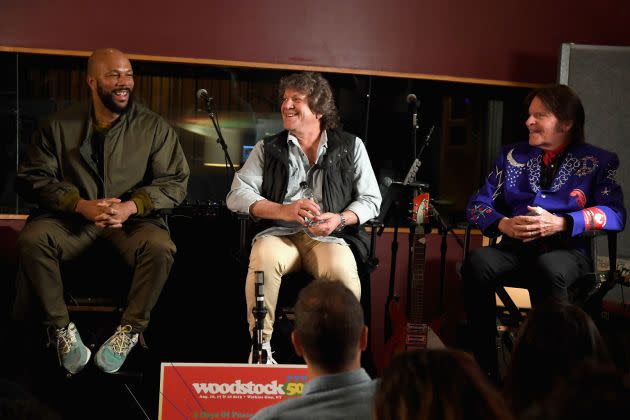John Fogerty, Common and Michael Lang Celebrate Woodstock’s Past & Future at Electric Lady Studios
- Oops!Something went wrong.Please try again later.
- Oops!Something went wrong.Please try again later.

John Fogerty played a ’68 Rickenbacker during his set at Woodstock with Creedence Clearwater Revival in 1969, and he later wrote “Green River” and “Travelin’ Band” on that same guitar. In spite of the instrument’s notoriety in Fogerty’s arsenal, it left his grasp at some point in the ’70s when he gave it away to two kids who used to hang around the band in San Francisco. His wife, Julie, eventually tracked it down and surprised him with it for Christmas one year.
This was one of the many stories Fogerty told for an intimate crowd on Tuesday night (March 19) at New York’s Electric Lady Studios, where he belted out a few CCR hits — including “Who’ll Stop The Rain,” which he wrote about Woodstock and played on that Rickenbacker — and shared his memories of the festival while celebrating Woodstock 50, the next chapter of its legacy.
More from Billboard
Kenya Grace Eyes Top 3 Finish on U.K. Chart With 'Strangers'
Doja Cat Nabs Another U.K. Chart Title With 'Paint The Town Red'
In addition to the announcement of the Woodstock 50 lineup, Fogerty’s performance and a spirited set from Common –– the two artists who will join Jay-Z, Miley Cyrus, Halsey, The Killers, Chance The Rapper and more over the weekend of Aug. 16-18 in Watkins Glen, N.Y. — spoke on the festival’s place in popular culture and its relevancy in 2019. Michael Lang, who produced the original Woodstock and its golden anniversary event, joined them in conversation, as did Andy Bernstein, who founded Headcount.org, an organization that makes it easy and accessible for patrons to register to vote at festivals and other live music events.
Common, though born in 1972, stressed that Woodstock was his “first awareness of a festival,” and that Jimi Hendrix — who played Woodstock, and built the studio in which this conversation took place — was a huge influence on him. When asked about how he felt about the festival’s embrace of hip-hop, he was adamant in his approval and praised Lang for taking a page from his kids’ playbook. (Lang credited his children for introducing him to Chance The Rapper, specifically.)
But Fogerty was the star of the evening between the news, songs and storytelling, the assurance that the new iteration of Woodstock will embrace crucial aspects — and the talent — of the original. Introducing himself as “the guy who followed the Grateful Dead” and wearing a royal blue jacket emblazoned with Woodstock-inspired embroidery, he recalled his late night set at the festival and threw in an impression of the Dead’s stage banter for good measure.
As Lang had earlier in the chat, he stressed the connection between Woodstock and how it offered solidarity and the spirit of activism for those looking for it in a moment of great political upheaval. Sharing his own experiences living as a teenager who was drafted into the Army reserve during the Vietnam War, he connected the dots between that fractured moment in American history and the current one we’re living in — which, in turn, strengthened the ties between the motivation for Woodstock and that of Woodstock 50.
The festival’s mission hasn’t changed in half a century, even if the context in the world around it has — but thankfully Fogerty will be there to howl through “Fortunate Son” at a Woodstock that’s got one foot in the past and the other standing proudly in the present.
Best of Billboard
